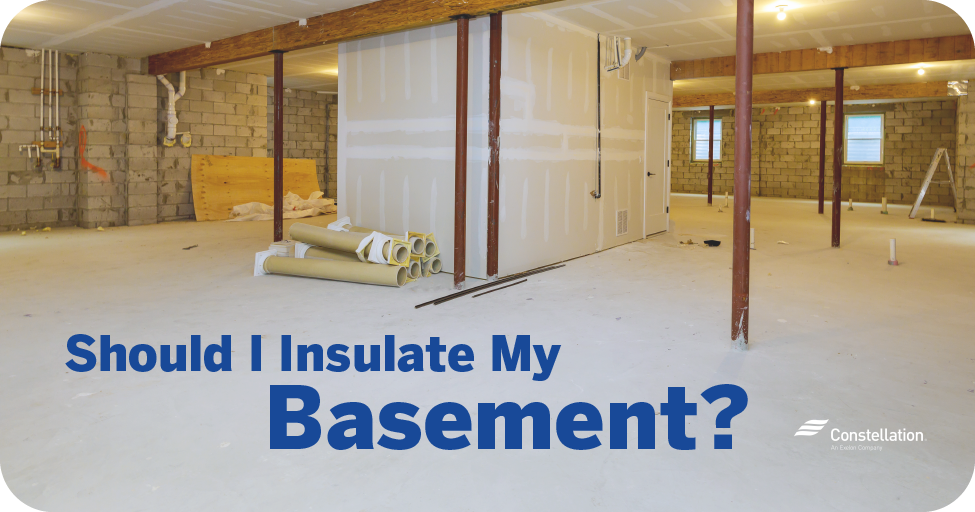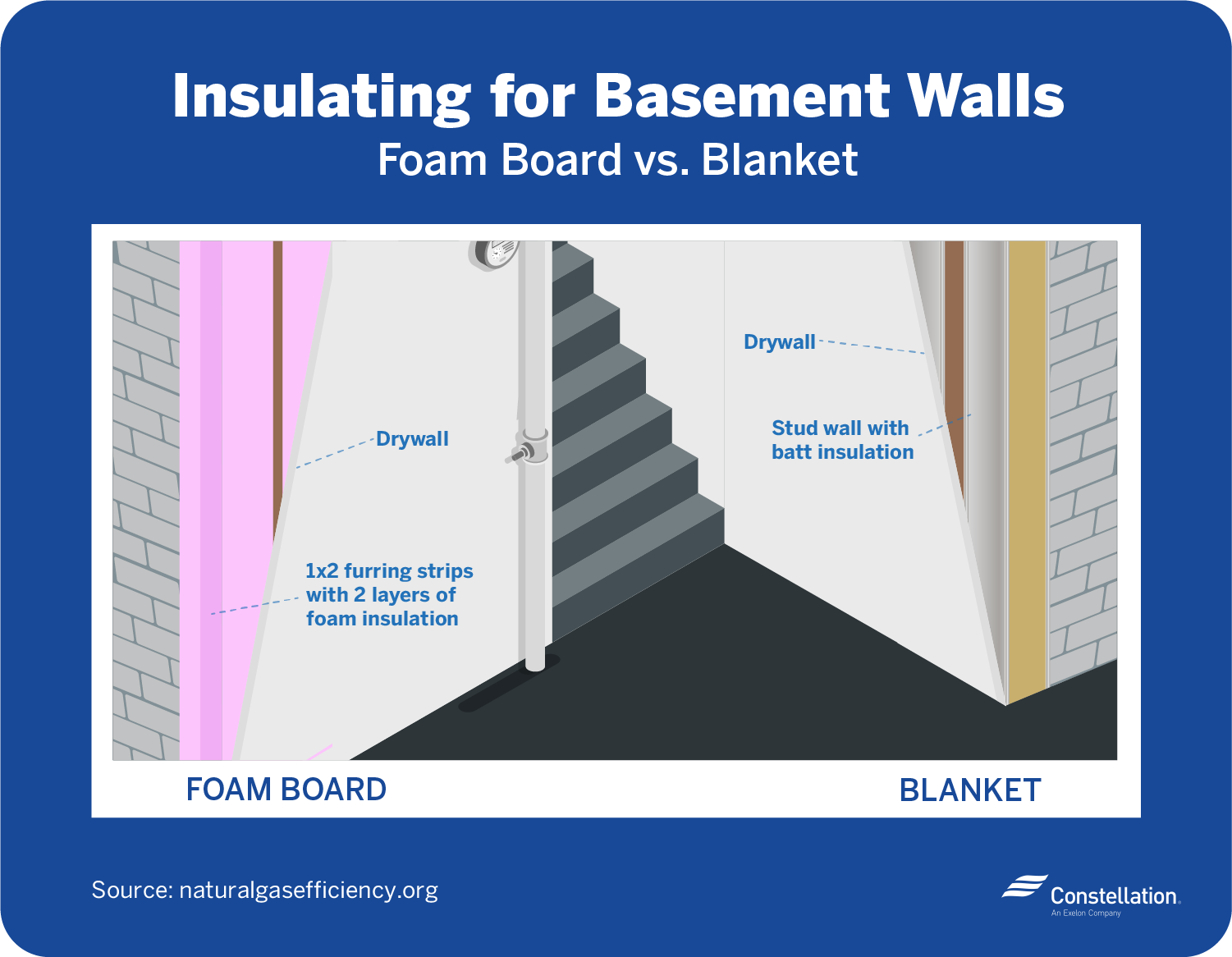
- Category:
Home Energy Savings - Published:
October 21, 2016 - Updated:
November 30, 2021
Should I Insulate My Basement?
The basement is often an easy part of the house to ignore. But there are some improvements you can make to better protect and utilize the space. For example, insulating a basement can be an easy way to improve your home’s energy efficiency, especially if it’s an older home. In addition to reducing heating costs, insulating basement ceilings and walls helps prevent moisture problems, insect infestations and radon infiltration.
Here are some basement insulation tips to help you get started.
Is insulating my basement worth it?
Making the most of your basement space
Is insulating my basement worth it?
Adding basement insulation can improve your heating efficiency and help keep the rooms at or above a more comfortable temperature. The real choice comes in deciding what part of your basement to insulate. You can opt to tackle your entire basement or decide to insulate just the walls, ceilings or floors.
Things to consider before adding basement insulation
Here are some points to consider while deciding if insulating a basement is in your home improvement future.
- How much insulation do you currently have? A home energy audit can help get you started. If the answer is none, then you can leap right down to basement insulation tips.
- What is the R-value of your existing insulation? R-value is how much your insulation resists heat flow—the thicker the insulation, the higher the R-value and overall effectiveness of the insulation. Choosing the right R-value for your space is important and will also affect the type of insulation you should choose.
- Do you have a basement moisture problem? If your basement floods or has any water or air leaks, you should address these issues before adding insulation. That’s because any insulation you might install on, say, the walls would potentially get ruined with excessive moisture.
- What type of basement do you have? Whether your basement is finished, unfinished or a crawl space will help determine both the type and amount of insulation to install in your basement.
Virtually every basement has some kind of heat loss, and heat loss means you’re paying more to heat your home. Heat (not hot air) moves from higher temperatures to lower temperatures, and it moves faster when the temperature difference across a material is greater.
Insulating a basement seems a fairly safe choice, then, on some level. The critical issue, though, is where and how to add insulation.
How to insulate your basement
For your basement insulation to work most effectively, it’s important that it’s properly selected and installed. For example, you’ll want to know what type of insulation should be used in your basement and whether that will differ based on things like your local climate or energy consumption patterns.
Use the following tips to learn more about how to insulate your basement walls, ceiling and floor.
Insulating basement walls
Insulating basement walls is a smart move if you live in Climate Zone 3 or colder. Whether you’re adding new insulation or improving on what you already have, insulating your interior basement walls can help you save on heating costs over time.
Here are some points to consider when insulating basement walls:
- Avoid using rigid foam if your basement has stone and mortar walls. Only closed-cell spray polyurethane foam will work on this kind of surface.
- Interior insulation reduces the usable interior space. According to Energy.gov, adding interior wall insulation to your basement can reduce the amount of usable space by a few inches.
- Many insulation types require a fire-rated covering. This is because they have the potential to release toxic gases if ignited.
- Adding vapor retarders can help control moisture in your home. Do you need a vapor barrier in your basement walls? They can be a useful addition to a home with humidity problems, as vapor diffusion retarders help ensure excess moisture is contained.
Material types for insulating basement walls
When deciding on what type of insulation should be used in your basement, there are a few different options to choose from.
- Blanket (batt and roll) insulation. This can be made of a variety of materials, including fiberglass, mineral (rock or slag wool), plastic fibers and natural fibers. It’s typically fitted between studs, joists and beams. It’s generally less expensive than some other insulation types.
- Foam board or rigid foam insulation. This insulation can be made of polyurethane, polyisocyanurate or polystyrene. It has a high insulating value compared to its thickness. However, you’ll need to add an additional layer of gypsum board to meet fire codes.
- Loose-fill insulation. Composed of cellulose, fiberglass or mineral, this type of insulation can be useful for adding insulation to finished areas, particularly areas that are oddly-shaped or that have obstacles such as beams.
- Sprayed foam insulation. This option can be a particularly good choice for those who want a finished basement space. Insulation materials can include cementitious, phenolic, polyisocyanurate and polyurethane. As its name implies, it’s sprayed into place.
Insulating basement floors
Before starting any basement floor insulation project, it’s crucial to determine whether moisture is an issue. You’ll also want to consider the following:
- If the floor is concrete, clean it and seal with epoxy once dry.
- Install sub-floor to make room for basement floor insulation.
- Add insulation, such as fiberglass, foam board or modular flooring from a basement finishing system.
- Investing in an in-floor heating system for your basement can help keep the space warmer in the winter and decrease the energy use of any utilities in the basement.
Insulating basement ceilings
Whether or not you should insulate your basement ceiling is up for some discussion. Energy.gov recommends focusing on basement walls over basement ceilings when looking into insulating a basement. However, ceiling insulation can offer some worthwhile benefits. If you’re on the fence about insulating your basement ceiling, here are some things to consider:
- Insulating your basement ceiling can help mitigate heat loss and potentially lower your energy costs.
- Fiberglass batt insulation tends to fit more easily among the many pipes and joists found in most basement ceilings.
- The R-value of your basement ceiling may differ from the R-value of the insulation you choose because heat flows more easily through studs, joists and other building materials.
- If you plan to use your basement as a living space, you’ll want to insulate the walls as well as the ceiling.
Making the most of your basement space
Whether it’s added to your walls, ceiling or floor, basement insulation helps make the space more comfortable and energy-efficient. It’s also a home improvement project that can increase your property value, as well as help prevent basement flooding. For more tips on properly insulating your home, check out our post on attic insulation.





